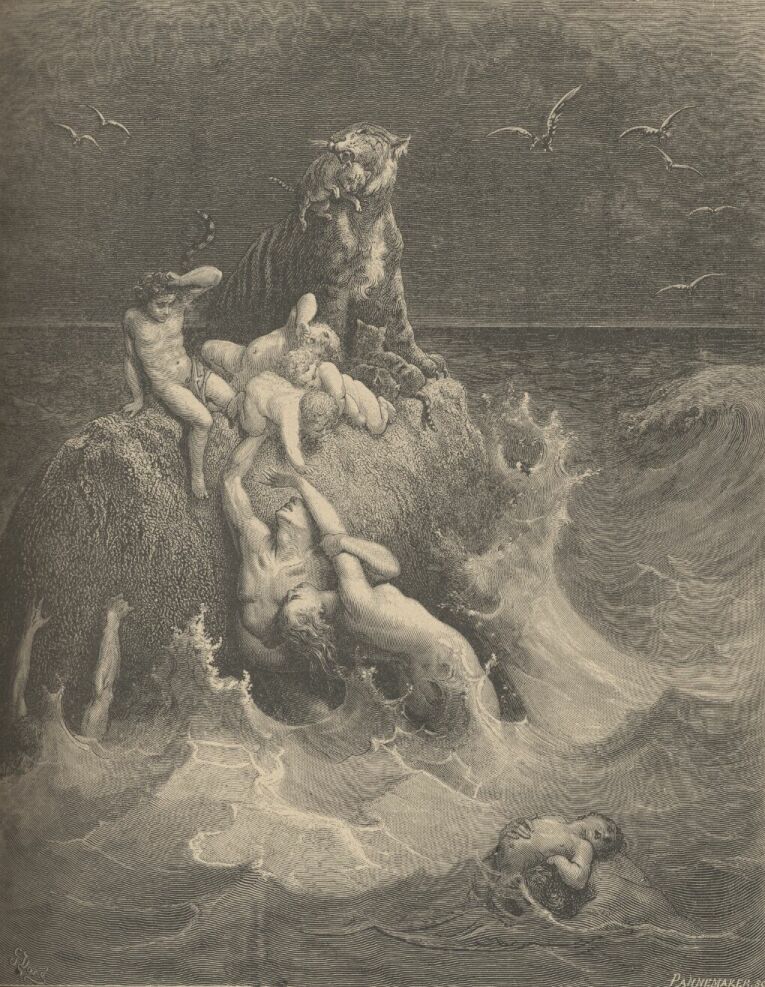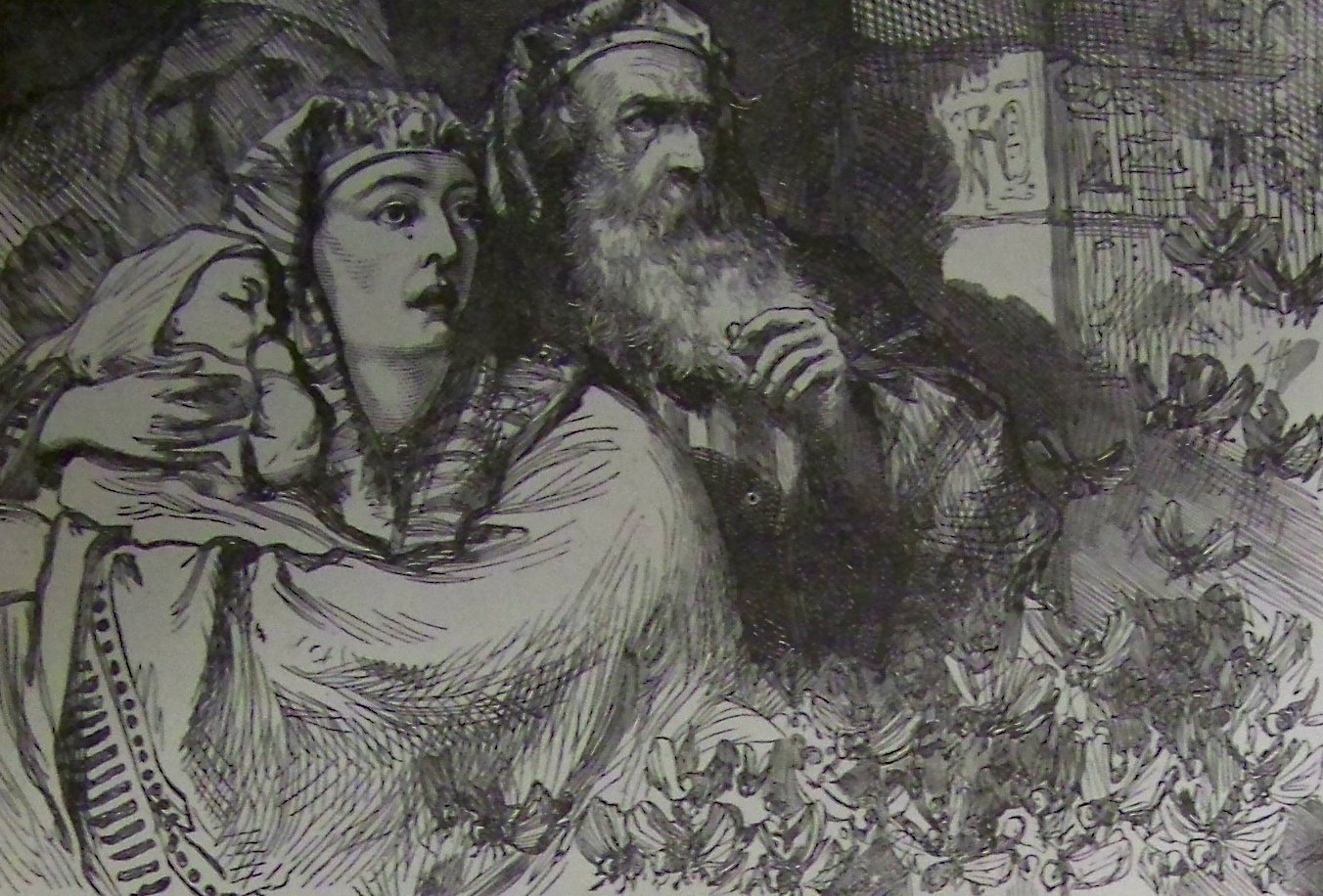Today we read about plagues eight and nine and the preparation for plague ten. If you are interested in comparing the plagues, I recommend you take a glance at this table of the plagues on Wikipedia. For each plague, it tells, amongst other things, whether there was a warning (yes on 7/10), whether or not the Israelites were spared (yes on 5/10), and who hardened Pharaoh's heart (God 4/10, passive voice 4/10, Pharaoh 2/10).
I discussed God and his hardening of Pharaoh's heart yesterday, but I must point out what God says today in preparation for the plague of locusts.
I have made [Pharaoh] and his officials stubborn so I can display my miraculous signs among them. I've also done it so you can tell your children and grandchildren about how I made a mockery of the Egyptians and about the signs I displayed among them -- and so you will know that I am the Lord.All of this death and destruction, all of this carnage, happens because God wants to make a mockery of the Egyptians. I have to say that as someone who does not assume a priori that this God is a loving God this sounds disgusting. Positively, undeniably disgusting.
Pharaoh almost gives in to the threat of the locusts. He says that he will let the men of Israel go and worship but not the women or children, and he will not let them take the livestock. Clearly, Moses' lie about just wanting to go worship appears as obvious to Pharaoh as it does to those of us who read the account of Moses' initial exchange with God. Because Pharaoh will not agree to letting all the Israelites go, God calls locusts down upon the land.
Pharaoh begs Moses to take the locusts away. Moses does so. Pharaoh goes back on his promise to let the Israelites go, and so we get the ninth plague: the plague of darkness. God covered Egypt with "a darkness so thick you can feel it." To get rid of the darkness, Pharaoh offered to let all the Israelites go worship their God, but would not allow them to take any animals. Moses does not accept that.
God and Moses plot the final plague. The plan was for this plague to cause the Egyptians to be happy to get rid of the Israelites. Moses told the people of Israel to ask their Egyptian neighbors for gold and silver. The Egyptians would give it because
the Lord had caused the Egyptians to look favorably on the people of Israel. And Moses was considered a very great man in the land of Egypt, respected by Pharaoh's officials and the Egyptian people alike.I wonder if something was lost in translation here. I cannot believe that the Egyptians looked favorably upon the people of Israel. Fear or awe I would buy, but favor? Not likely.
God says that he will kill the firstborn of every family "Even the firstborn of all the livestock." Very odd that will kill the firstborn of all the livestock given that all the livestock were supposedly killed in the fifth plague. From Exodus 9:6
And the Lord did just as he had said. The next morning all the livestock of the Egyptians died, but the Israelites didn’t lose a single animal.Preparation for this slaughter gave rise to the tradition of Passover. Each family was to kill an animal and smear its blood on the door of their home to indicate to God that he should kill no one in that home. I guess the purpose of this must be to make sure that the Israelites are obedient. Certainly God would not need the blood to know which homes belonged to the Israelites.
New Testament
Today's reading contains the parable of the vineyard workers. A landowner goes out in the morning and hires a bunch of people to work in his field. He does the same thing again throughout the day. At the end of the day, he pays all the men a full day's wage regardless of how long they worked. Now, as an analogy to heavenly rewards, I am sure this provides all sorts of insight and comfort (does not matter how long you have been a believer as long as you came when you were called, blah blah etc.).
However, from an economic perspective, it makes not one bit of sense; the analogy only works if you assume there is only one ultimate pay day. It is not a sustainable economic position. As the landowner points out, he can legally choose to pay all workers the same amount regardless of how long they work, but it his scheme will quickly destroy moral. Workers will try to get hired at the end of the day, or they will not work as hard during the day knowing that they get the full days wages anyway. One thing I am learning as I read the Bible: do not go to it for management advice.
Psalms and Proverbs
 Today's psalm is another where David asks God not to let his enemies conquer him. It has a good line though.
Today's psalm is another where David asks God not to let his enemies conquer him. It has a good line though.Remember, O Lord, your compassion and unfailing loveGiven the slaughter the current Exodus readings contain, it certainly seems like God need to be reminded of his compassion and love. Beyond repeated claims in the Psalms that God does have unfailing love, have we seen God's love so far? For particular individuals perhaps, but not in any general sense. Unless you say that God showed his "love" by not killing all of humanity in the flood, just most of it.
In Proverbs we learn to
Take a lesson from the ants, you lazybones.Now I will admit to some confusion. In Matthew 6 Jesus said,
Learn from their ways and become wise!
Though they have no prince
or governor or ruler to make them work,
they labor hard all summer,
gathering food for the winter.
That is why I tell you not to worry about everyday life—whether you have enough food and drink, or enough clothes to wear. Isn’t life more than food, and your body more than clothing? Look at the birds. They don’t plant or harvest or store food in barns, for your heavenly Father feeds them. And aren’t you far more valuable to him than they are? Can all your worries add a single moment to your life?So which should I be like, the industrious ants or the carefree and trusting birds? Maybe I should just be human, able to balance work and pleasure as appropriate. Able to prepare for winter without forgoing the joy of summer.



No comments:
Post a Comment